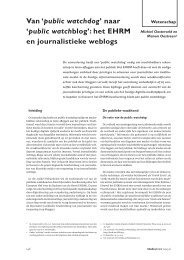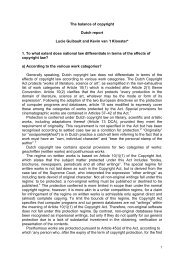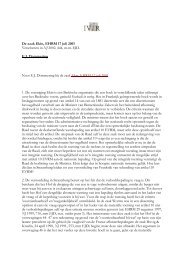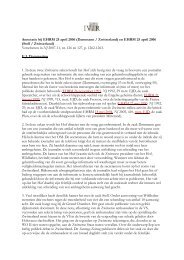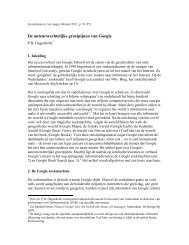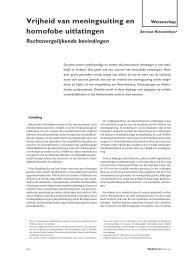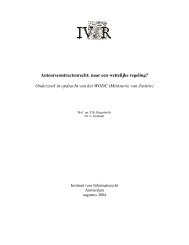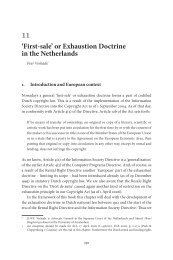ADAPTING COPYRIGHT TO THE INFORMATION ... - IViR
ADAPTING COPYRIGHT TO THE INFORMATION ... - IViR
ADAPTING COPYRIGHT TO THE INFORMATION ... - IViR
You also want an ePaper? Increase the reach of your titles
YUMPU automatically turns print PDFs into web optimized ePapers that Google loves.
and legislators in determining the scope of the notion of `reproduction' 14 .<br />
At present, in many countries the copyright status of temporary storage is unclear. An<br />
exception is the United Kingdom; under Section 17 (6) of the Copyright, Designs and<br />
Patents Act (CDPA) `[c]opying in relation to any description of work includes the<br />
making of copies which are transient or are incidental to some other use of the work.' In<br />
contrast, Section 101 of the United States Copyright Act distinguishes between merely<br />
`transitory' storage and more permanent or stable forms of reproduction. This follows<br />
from the definition of the term `fixed' used in the definition of `copies' in Section 101:<br />
`A work is "fixed" in a tangible medium of expression when its embodiment in a<br />
copy or phonorecord, by or under the authority of the author, is sufficiently<br />
permanent or stable to permit it to be perceived, reproduced, or otherwise<br />
communicated for a period of more than transitory duration.'<br />
Perhaps, not all forms of temporary storage should be treated equally under copyright<br />
law. Acts of short-lived copying as mere byproducts of a technical communication<br />
process, such as the `store-and-forward' mechanisms used on the Internet and other<br />
digital networks, should not be qualified as acts of reproduction. A similar argument can<br />
be made in respect of screen display; see below at § 2.7.<br />
2.3 Providing on-line access; delivery-on-demand<br />
What makes the superhighway infrastructure really different from existing broadcasting<br />
or cable networks is its capacity for two-way communication. By linking an existing<br />
information bank to a publicly accessible host or server, the information contained in the<br />
information bank becomes instantly available to the (general) public. Does this amount<br />
to a restricted act? Probably not under the Berne Convention. The Convention does not<br />
provide for a general right of communication to the public, such as the Dutch `recht van<br />
openbaarmaking' 15 .<br />
Providing on-line access and disseminating works over networks are acts of exploitation<br />
that do not fit nicely in those national laws that list the protected acts in a platformspecific<br />
manner. The copyright status of electronic delivery on demand appears to be<br />
especially problematic in Germany. Electronic delivery-on-demand probably does not<br />
qualify as either `distribution', `broadcasting' or other act of communication restricted by<br />
the German Copyright Act. By contrast, the performance right in France, including a<br />
broadly defined right of `télédiffusion', appears to be especially well adapted to the<br />
digital environment. 16<br />
Many national legislators fail to deal with the mere act of making a work accessible (by<br />
14 Cf. Bundesgerichtshof (German Supreme Court), Decision of 20 January 1994 (`Holzhandelsprogramm'),<br />
Computer und Recht 1994, 275. The Court left expressly undecided the question of whether<br />
the act of running a computer program is restricted under the Software Directive.<br />
15 Dutch Copyright Act, article 12.<br />
16 Article L-122 (2) of the French Copyright Act; see A. Lucas & H.-J. Lucas, Traité de la propriété<br />
littéraire et artistique, Paris, 1994, no. 338. See for a general overview of the law in EU and EFTA<br />
Member States: P.B. Hugenholtz and D.J.G. Visser, Copyright problems of electronic document<br />
delivery: a comparative analysis, Report to the Commission of the European Communities,<br />
Luxembourg, 1995.



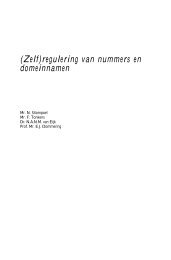
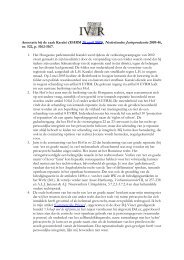
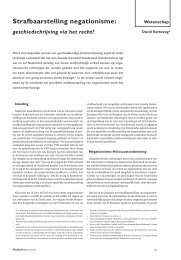
![Legal Opinion of Professor Egbert Dommering [1] concerning ... - IViR](https://img.yumpu.com/23603085/1/184x260/legal-opinion-of-professor-egbert-dommering-1-concerning-ivir.jpg?quality=85)
